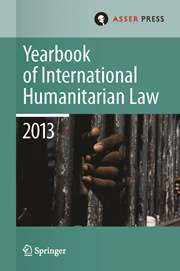No CrossRef data available.
Article contents
Operation Unified Protector and the Protection of Civilians in Libya
Published online by Cambridge University Press: 08 August 2012
Extract
In the aftermath of the events which took place in Egypt and Tunisia, riots against the autocratic regime of Colonel Gaddafi broke out on 15th February 2011. Two weeks later, the regime lost control of major parts of the country after violent clashes between pro- and anti-Gaddafi supporters which led to a refugee crisis in the vicinity of its borders with Tunisia and Egypt. On 26th February 2011, the United Nations Security Council [hereafter: the Council] unanimously adopted Security Council Resolution 1970 [hereafter: UNSCR 1970] in order to implement an arms embargo on Libya; in addition, the resolution required a travel ban be imposed on Gaddafi and senior regime members and called for their private assets to be frozen. In accordance with UNSCR1970, the European Union imposed an arms embargo on Libya that was broader in scope than that provided for in the resolution. Concerned by the deteriorating situation in Libya, the League of Arab States, as a regional organization, condemned Gaddafi and called on the UN to impose a No Fly Zone [hereafter: NFZ] over Libya to protect the civilian population. On 17th March 2011, the Council adopted UNSCR 1973. Acting under Chapter VII of the UN Charter, it authorized States to take ‘all necessary measures’ to protect civilians and civilian populated areas under threat of attack in Libya. It also decided to establish a ban on all flights in Libyan airspace in order to help protect civilians. Finally, it allowed States to inspect in their territory (including seaports and airports) and on the high seas, vessels and aircraft bound to or from Libya, if the State had information that provided reasonable grounds to believe that they carried prohibited items.
- Type
- Current Developments
- Information
- Copyright
- Copyright © T.M.C. Asser Instituut and the Authors 2011




